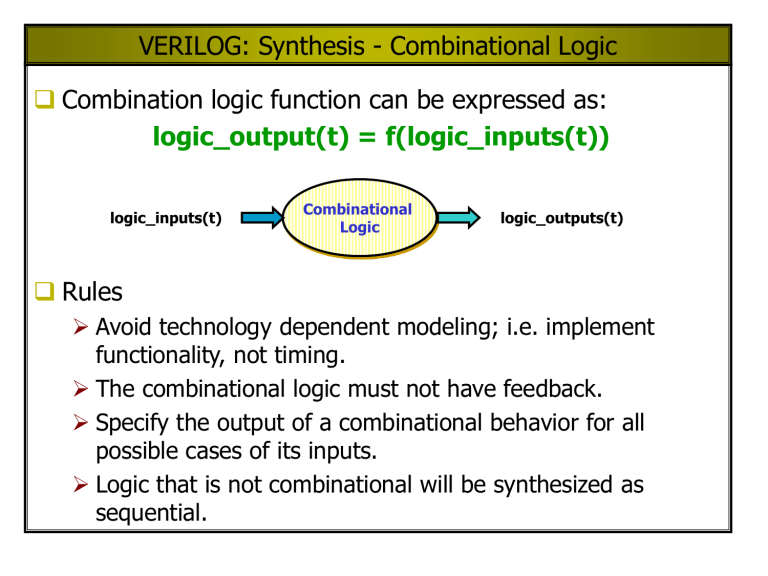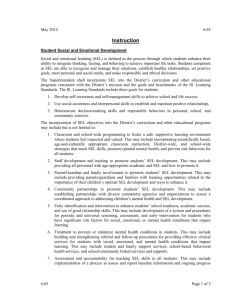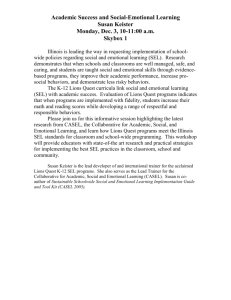VERILOG: Synthesis - Combinational Logic

VERILOG: Synthesis - Combinational Logic
Combination logic function can be expressed as: logic_output(t) = f(logic_inputs(t)) logic_inputs(t)
Combinational
Logic logic_outputs(t)
Rules
Avoid technology dependent modeling; i.e. implement functionality, not timing.
The combinational logic must not have feedback.
Specify the output of a combinational behavior for all possible cases of its inputs.
Logic that is not combinational will be synthesized as sequential.
Styles for Synthesizable Combinational Logic
Synthesizable combinational can have following styles
Netlist of gate instances and Verilog primitives (Fully structural)
Combinational UDP (Some tools)
Functions
Continuous Assignments
Behavioral statements
Tasks without event or delay control
Interconnected modules of the above
Synthesis of Combinational Logic – Gate Netlist
Synthesis tools further optimize a gate netlist specified in terms of Verilog primitives
Example:
module or_nand_1 (enable, x1, x2, x3, x4, y); input enable, x1, x2, x3, x4; output y; wire w1, w2, w3; or (w1, x1, x2); or (w2, x3, x4); or (w3, x3, x4); // redundant nand (y, w1, w2, w3, enable); endmodule
Synthesis of Combinational Logic – Gate Netlist (cont.)
General Steps:
Logic gates are translated to Boolean equations.
The Boolean equations are optimized.
Optimized Boolean equations are covered by library gates.
Complex behavior that is modeled by gates is not mapped to complex library cells (e.g. adder, multiplier)
The user interface allows gate-level models to be preserved in synthesis.
Synthesis of Combinational Logic – Continuous Assignments
Example:
module or_nand_2 (enable, x1, x2, x3, x4, y); input enable, x1, x2, x3, x4; output y; assign y = !(enable & (x1 | x2) & (x3 | x4)); endmodule
Synthesis of Combinational Logic – Behavioral Style
Example:
module or_nand_3 (enable, x1, x2, x3, x4, y); input enable, x1, x2, x3, x4; output y; reg y; always @ (enable or x1 or x2 or x3 or x4) if (enable) y = !((x1 | x2) & (x3 | x4)); else y = 1; // operand is a constant.
endmodule
Note: Inputs to the behavior must be included in the event control expression, otherwise a latch will be inferred.
Synthesis of Combinational Logic – Functions
Example:
module or_nand_4 (enable, x1, x2, x3, x4, y); input enable, x1, x2, x3, x4; output y; assign y = or_nand (enable, x1, x2, x3, x4); function or_nand; input enable, x1, x2, x3, x4; begin or_nand = ~(enable & (x1 | x2) & (x3 | x4)); end endfunction endmodule
Synthesis of Combinational Logic – Tasks
Example:
module or_nand_5 (enable, x1, x2, x3, x4, y); input enable, x1, x2, x3, x4; output y; reg y; always @ (enable or x1 or x2 or x3 or x4) or_nand (enable, x1, x2, x3c, x4); task or_nand; input enable, x1, x2, x3, x4; output y; begin y = !(enable & (x1 | x2) & (x3 | x4)); end endtask endmodule
Construct to Avoid for Combinational Synthesis
Edge-dependent event control
Multiple event controls within the same behavior
Named events
Feedback loops
Procedural-continuous assignment containing event or delay control
fork ... join blocks
wait statements
External disable statements
Procedural loops with timing
Data dependent loops
Tasks with timing controls
Sequential UDPs
Synthesis of Multiplexors
Conditional Operator
module mux_4bits(y, a, b, c, d, sel); input [3:0] a, b, c, d; input [1:0] sel; output [3:0] y; assign y =
(sel == 0) ? a :
(sel == 1) ? b :
(sel == 2) ? c :
(sel == 3) ? d : 4'bx; endmodule a[3:0] b[3:0] c[3:0] d[3:0] sel[1:0] y[3:0]
Synthesis of Multiplexors (cont.)
CASE Statement
module mux_4bits (y, a, b, c, d, sel); input [3:0] a, b, c, d; input [1:0] sel output [3:0] y; reg [3:0] y; always @ (a or b or c or d or sel) case (sel)
0: y = a;
1: y = b;
2: y = c;
3: y = d; default: y = 4'bx; endcase endmodule a[3:0] b[3:0] c[3:0] d[3:0] sel[1:0] y[3:0]
Synthesis of Multiplexors (cont.)
if .. else Statement
module mux_4bits (y, a, b, c, d, sel); input [3:0] a, b, c, d; input [1:0] sel output [3:0] y; reg [3:0] y; always @ (a or b or c or d or sel) if (sel == 0) y = a; else if (sel == 1) y = b; else if (sel == 2) y = c; else if (sel == 3) y = d; else y = 4'bx; endmodule a[3:0] b[3:0] c[3:0] d[3:0] sel[1:0] y[3:0]
Note:
CASE
statement and
if/else
statements are more preferred and recommended styles for inferring MUX
Unwanted Latches
Unintentional latches generally result from incomplete case statement or conditional branch
Example: case statement always @ (sel_a or sel_b or data_a or data_b) case ({sel_a, sel_b})
2'b10: y_out = data_a;
2'b01: y_out = data_b; endcase
The latch is enabled by the "event or" of the cases under which assignment is explicitly made. e.g. ({sel_a, sel_b}
== 2'b10) or ({sel_a, sel_b} == 2'b01 )
Unwanted Latches (cont.)
Example: if .. else statement always @ (sel_a or sel_b or data_a or data_b) if ({sel_a, sel_b} == 2’b10) y_out = data_a; else if ({sel_a, sel_b} == 2’b01) y_out = data_b;
Priority Logic
When the branching of a conditional (if) is not mutually exclusive, or when the branches of a case statement are not mutually exclusive, the synthesis tool will create a priority structure.
Example:
module mux_4pri (y, a, b, c, d, sel_a, sel_b, sel_c); input a, b, c, d, sel_a, sel_b, sel_c; output y; reg y; always @ (sel_a or sel_b or sel_c or a or b or c or d) begin if (sel_a == 1) y = a; else if (sel_b == 0) y = b; else if (sel_c == 1) y = c; else y = d; end endmodule
VERILOG: Synthesis - Sequential Logic
General Rule: A variable will be synthesized as a flip-flop when its value is assigned synchronously with an edge of a signal.
Example:
module D_reg4a (Data_in, clock, reset, Data_out); input [3:0] Data_in; input clock, reset; output [3:0] Data_out; reg [3:0] Data_out; always @ (posedge reset or posedge clock) if (reset == 1'b1) Data_out <= 4'b0; else Data_out <= Data_in; endmodule
Registered Combinational Logic
Combinational logic that is included in a synchronous behavior will be synthesized
with registered output.
Example:
module mux_reg (a, b, c, d, y, select, clock); input [7:0] a, b, c, d; output [7:0] y; input [1:0] select; reg [7:0] y; always @ (posedge clock) case (select)
0: y <= a; // non-blocking
1: y <= b; // same result with =
2: y <= c;
3: y <= d; default y <= 8'bx; endcase endmodule
Verilog Shift Register
Shift register can be implemented knowing how the flip-flops are connected always @ (posedge clock) begin if (reset == 1'b1) begin reg_a <= 1'b0; reg_b <= 1'b0; reg_c <= 1'b0; reg_d <= 1'b0; end else begin reg_a <= Shift_in; reg_b <= reg_a; reg_c <= reg_b; reg_d <= reg_c; end end
Verilog Shift Register
Shift register can be implemented using concatenation operation referencing the register outputs
module Shift_reg4 (Data_out, Data_in, clock, reset); input Data_in, clock, reset; output Data_out; reg [3:0] Data_reg; assign Data_out = Data_reg[0]; always @ (negedge reset or posedge clock) begin if (reset == 1'b0) Data_reg <= 4'b0; else Data_reg <= {Data_in, Data_reg[3:1]}; end endmodule
Verilog Ripple Counter
4-bit Ripple Counter
Verilog Ripple Counter
module ripple_counter (clock, toggle, reset, count); input clock, toggle, reset; output [3:0] count; reg [3:0] count; wire c0, c1, c2; assign c0 = count[0], c1 = count[1], c2 = count[2]; always @ (posedge reset or posedge clock) if (reset == 1'b1) count[0] <= 1'b0; else if (toggle == 1'b1) count[0] <= ~count[0]; always @ (posedge reset or negedge c0) if (reset == 1'b1) count[1] <= 1'b0; else if (toggle == 1'b1) count[1] <= ~count[1]; always @ (posedge reset or negedge c1) if (reset == 1'b1) count[2] <= 1'b0; else if (toggle == 1'b1) count[2] <= ~count[2]; always @ (posedge reset or negedge c2) if (reset == 1'b1) count[3] <= 1'b0; else if (toggle == 1'b1) count[3] <= ~count[3]; endmodule
Synthesis Result
Verilog Up/Down Counter
Functional Specs.
Load counter with Data_in when load = 1
Counter counts when counter_on = 1
counts-up when count_up = 1
Counts-down when count_up = 0
Verilog Up/Down Counter (cont.)
module up_down_counter (clk, reset, load, count_up, counter_on, Data_in, Count); input clk, reset, load, count_up, counter_on; input [2:0] Data_in; output [2:0] Count; reg [2:0] Count; always @ (posedge reset or posedge clk) if (reset == 1'b1)
Count = 3'b0; else if (load == 1'b1)
Count = Data_in; else if (counter_on == 1'b1) begin if (count_up == 1'b1)
Count = Count +1; else Count = Count –1; end endmodule







